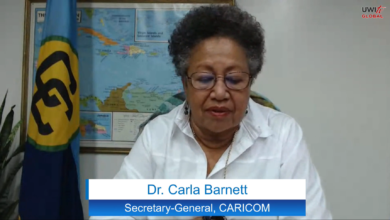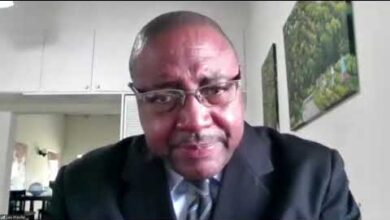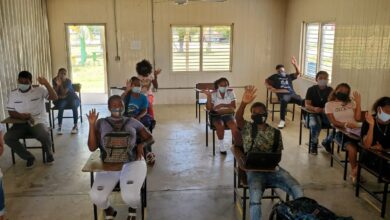Ministers representing Ministries of the Government of Guyana,
Secretary-General of the Caribbean Community,
Members of the Diplomatic Core,
Members of the Business Community,
Representative of Workers Organisations ,
Other Non Governmental Organisations ,
Ladies and gentlemen
Welcome
THE BASIC RATIONALE
Nations and peoples advance and progress even when circumstances confront them that appear to be insurmountable, if , they can recognize, and, more importantly, seize opportunities which are present and if they muster the collective will necessary to overcome threats and surmount obstacles which stand in the way of progress.
Today people in small countries such as the people of the Caribbean Community are confronted with situations both at home and in the wider world environment which threaten to frustrate our economic development and which call for a special type of collective resolve to chart the way through a changing and turbulent world economy .We cannot set ourselves apart from the global economic and trading system even though we are in a tremendously disadvantageous position compared to some of its dominant and strongest players with whom we must do business.
Guyana has joined forces with other small States in the Caribbean in an attempt to answer the challenges presented by today’s world economy recognizing as we have done several decades ago that to go it alone does not seem to be an option at all..
An economically stronger and more unified Caribbean Community is a necessary platform which we must build and which we must use in facing and engaging a rapidly changing global economic and trading system. As you are well aware, Guyana and its sister CARICOM member states have to trade and engage economically in a world system that is dominated by some very large economies and super large corporations which together are the centers of concentrations of vast wealth and form a magnet pole from which and to which capital , investment , production and distribution of goods and services flow.
As individual small states we are swept along in the outer slip stream of the economic currents which reverberate from these poles of economic power. We face the real danger of being swept further and farther into the outer fringes of this economic slip stream if we do not adapt and deploy strategies which will be effective not only in ensuring that we remain relevant but also ensuring that we share in the prosperity and vast economic fortune which is being generated in today’s world economy.
Our challenge is basically twofold. On the one hand we must preserve our identity, work to maintain stability our countries and deploy strategies which protect and promote our economic interest and well being , and, we must also identify and exploit those opportunities which will result in economic growth and expansion at a pace that increase the individual and collective prosperity of our peoples. We must do this wile on the other hand we integrate into the very world economy which contain the factors and forces which threaten our very survival.
Engagement in the world economy requires resources both to fend off the threats and to exploit opportunities and small state lack the repatuore of resources to do both effectively. The tried and tested maxim of united we stand divided we fall holds true and CARICOM as an integration movement has proven this over and over again.
We found ourselves in a situation at the beginning of and throughout the 1990’s where we were engaged simultaneously in multiple layers of trade negotiations arising from the momentum towards liberalization which has flowed from the Uruguay Round. We are involved in the ongoing World Trade Organisation (WTO) negotiations, in the Free Trade Area of the Americas(FTAA), in reforming the Lome Convention and in Caribbean Basin trade cooperation through the Association of Caribbean States(ACS) and a series of bilateral cooperation schemes with Columbia, Venezuela, Cuba , The Dominican Republic and Costa Rica. How is Guyana expected to cope with such a complex of engagements given our present economic condition and resources ?
Part of the solution was provided by our membership in CARICOM. The Heads of Government created a Prime Ministerial Sub-Committee to focus on the problem of external negotiations. They are ably supported by the CARICOM Ministers which are responsible for Trade and Foreign Affairs and by the Regional Negotiating Machinery. This is a clear example of how small countries can participate in a world economy where the challenges are disproportionately greater than the size and resource endowments of such small states.
While we in CARICOM have not always got what we wanted our contributions in the international arena and our strenuous efforts in defending our interests have not only bourne fruit but has not gone unnoticed. Our leadership in the Lome negotiations and in creating the ACS , the key position we hold in several FTAA negotiating areas and recent meetings with the Director General of the WTO and our role in CANCUN signal that we would not be left in the sidelines and that collectively we have the capacity to champion our cause an protect our economic interests.
While we engage the rest of the world to secure markets , opportunities for exports and arrangement which will increase the flow of investments into our economies we are working to create a larger economy at home to create opportunities for our local business and employment and higher income and standards of living for all CARIBBEAN peoples. Our collective action abroad is a direct extension of our collective action within CARICOM. to create a more integrated regional economy and together these constitute two key parts of CARICOM’s global development strategy.
We have as a country supported and actively participated in promoting deeper Caribbean regional integration as one of the strategic responses to the threats of the processes of globalisation and trade liberalization and the CARICOM Single Market and Economy (CSME) is the centerpiece of this strategy today. So where are we on this journey to create the CSME.?.
I have heard many doubters and nay-sayers criticize the pace of regional integration generally and the pace of creating the CSME in particular. The fact of the matter is that such a complex enterprise has to be built progressively given our resources. The CSME is a work-in- progress . It is not an event and cannot be created by a single action. It involves a process of improving the system of decision making and Community Governance ; it requires fundamental reform of the laws, regulations and administrative practices of each of our countries to guarantee rights and market access which we have undertaken in the Treaty in relation to , free movement of goods, services, capital, people and the right of establishment ; it necessitates the creation new institutions such as the Caribbean Court of Justice (CCJ), the Caribbean Regional Organisation for Standards and Quality .(CROSQ), a community Commission to regulate competition, institutions for Accreditation , for enforcing rules of trade relating to antidumping, phytosanitary practices and subsidization. It involves creating structures for coordinating monetary , fiscal and exchange rate policies and other macroeconomic measures which provide the overall environment within which business will be conducted and it involves a continuous process of policy evaluation and change to adapt to changing trade and market conditions. What have we achieved.?
IMPLEMENTATION OF THE CSME
Progress has been made in respect of action taken by Member States and the Community towards implementation of many of the components of the CSME. While progress has been made I will be the first to admit that there is still important tasks to be accomplished. Let me therefore deal first with what we have done.I need to spend time on this so that you will have a precise understanding of how much has been achieved
Legal and institutional framework, including The Treaty Establishing the Caribbean Community:
The Treaty has been revised. There is however a built in agenda for a set of disciplines which are yet to be negotiated. These areas are, electronic commerce, government procurement, treatment of goods produced in free zones and similar jurisdictions, free circulation of goods in the CSME and rights contingent on establishment, provision of services and movement of capital in the community.
The basic research to clarify the policy that would inform the way towards negotiating Treaty commitments in these areas has commenced and it is anticipated that these will be pursued during the next twenty four months.
All Member States except The Bahamas and Montserrat have signed the Revised Treaty and declared Provisional Application pending ratification. We are all working on the legislative steps for ratification and enactment into domestic law.
Chapter 2 of the Treaty on “Institutional Arrangements” is significant with respect to decision making and Community administration. With the exception of the full implementation of Article 26 : (The Consultative Process), the institutional arrangements under Chapter 2 have been implemented and are functioning. The schema and process for consultations are set out in the Treaty and CARICOM Secretariat has created a Manual Of Procedures for Implementing the CSME under which we have been working to establish the Inter Ministerial Consultative Committee and the Business and Labour Advisory Council (BLAC).
Administrative Procedures Reforms:
The Manual of Administrative Procedures is designed specifically for Civil Servants and Statutory Bodies with identifiable functions deriving from Member States’ obligations and commitments; the rules and disciplines, and, the rights of nationals of the Community under the Treaty.
Reform is under way within the Community Secretariat. A specialised CSME Unit designed to accelerate implementation has been established in Barbados and gives support to a Prime Ministerial Sub- Committee on the CSME which was specifically established by the Conference of Heads of Government to maintain focus on the CSME. The reform of institutions and Community administration must continue in step with what is needed to operate an efficient CSME. I, as your representative at the Heads of Government Conference, have already made representation on the issue of reform of CARICOM institutions and I maintain that we must engage in a wider process of institutional review and reform to ensure that we retain no unnecessary institutional baggage from the old CARICOM, retaining only those which are essential and redeploying resources into those which we need for the emerging CSME. You are all aware of the initiative by my Government in establishing a new building for the CARICOM Secretariat.
With respect to dispute settlement and other institutions the following developments are important:
Caribbean Court of Justice (CCJ) : The Agreement establishing the CCJ has been signed by all Member States except The Bahamas and Montserrat. The Agreement requires the deposit of instruments of ratification by three Member States for Entry into force and to date six Member States – Barbados, Belize, Guyana, St. Lucia, Suriname and Trinidad and Tobago – have ratified the Agreement. This brings the agreement into effect.
All of the other legislative instruments required to implement the Agreement and the formal establishment and functioning of the Court have been developed and Member States are actively taking the steps to complete legislative enactments. Trinidad and Tobago will be the seat of the Court and the facility to house the Court has been identified by the Government of Trinidad and Tobago.
A Trust Fund is being established with an endowment of US$100 million to secure the integrity, independence, sustainability and delivery of quality justice by the Court. The Court is expected to be fully operational during early 2004.
CARICOM Regional Organisation for Standards and Quality (CROSQ) : With the exception of Montserrat, all Member States have signed the Inter-Governmental Agreement Establishing CROSQ and have agreed to the Provisional Application of the Agreement among themselves pending Entry into Force. The Secretariat for CROSQ has been established in the headquarters state of Barbados and is functional..
Community Competition Commission and National Authorities : The CARICOM Secretariat has developed a competition law which paves the way once implemented in all Member States for the establishment and full operation of Community Competition Commission as an autonomous institution of the Community with quasi-judicial powers as provided for in Chapter Eight of the Treaty. Member States are required to establish or identify a national Competition Authority. The Secretariat is working towards completing the arrangement for the Commission by December 2005.
Implementing Laws and Regulations : Legislative reform to usher in the CSME is a major undertaking. The largest block of reforms to be undertaken falls under Chapter III of the Treaty relating to Establishment, Services, Skills and Capital. This work has not begun.
The second is a schedule of laws which are specified in Chapter Four of the Treaty under Article 74: Legal Infrastructure. Harmonisation of legislation is a crucial task to be accomplished in the establishment of the CSME. The Treaty recognises the Legal Affairs Committee as the competent body of the Community to lead this process. A Drafting Facility, funded by the USAID, has been established and has begun the task preparing Model Bills and Regulations.
With respect to harmonisation of laws and facilitation of implementation some of these named laws under Article 74 Model legislation has developed in a number of areas including companies, competition policy, consumer protection, anti-dumping and countervailing measures, customs laws and regulations. We need to accelerate the pace of legislative reform including such areas as harmonization of company law, intellectual property so as to create a coherent regulatory framework for the CSME
NATIONAL TREATMENT AND MARKET ACCESS
Progress relating to implementation of national treatment rights and market access commitments, obligations and instruments is most advanced in respect of goods but a solid foundation for rapid advances in respect of services, capital and skills and the free exercise of the right to establish commercial presence has also been laid.
Free Movement of Goods
The institutional requirements and, the laws and regulations and administrative procedures for the CSME regime for goods is almost entirely in place. The major outstanding are the legal framework and infrastructure relating to, establishment of presence, Free Circulation of Goods, trade involving Free Zones and similar jurisdictions, and Procurement of Goods by Governments.
Removal of restrictions on trade in goods has been achieved. However a recent study undertaken by the Secretariat indicates that some non-tariff restrictions remain; particularly para-tariffs, customs fees and charges and in some cases unauthorised licences, monopolies and technical regulations are being utilised as barriers. in Goods”. We must do everything in our power to remove the remaining restrictions before December 2005.
Free Movement of Services, Capital and Right of Establishment
The single markets for services and capital and the arrangements for the free exercise of the Right of Establishment is in the process of implementation. The research to identify in each Member State those restricting measures against free movement of services, capital and establishment revealed more than 400 different types of restrictions of which 140 is required to be removes by 31 December this year. All three areas have been integrated under a single programme which was established by the Conference of Heads of Government at its Thirteenth Inter-Sessional Meeting in February 2002.
The Programmes took effect from 1 March 2002 with a schedule and timetable for removal of restrictions spanning the short term (up to 31 December 2003), medium term (up to 31 December 2004) and long term (up to 31 December 2005). The effect of this is to expand the single market progressively through the national treatment / market access mechanisms in respect of services, capital and right of establishment in areas affected by existing restrictions.
With the exception of the areas reflected in the Programmes approved by the Conference of Heads of Government where specific restrictions are to be removed by 2005, the single markets for services, capital and the right to establish commercial presence has taken effect from 1 March 2002. Member States must as of that date permit Services, the Right of Establishment and the Movement of Capital where no restrictions are listed in their respective national schedules under the Programme. More particularly increasing benefits will flow to the categories of persons eligible to move freely including, temporary service providers, self-employed service providers and entrepreneurs, technical, managerial and supervisory personnel of entities establishing presence and spouses and immediate dependent family members.
The establishment of the Programmes by the Conference at its Thirteenth Inter-Sessional Meeting in February 2002,signalled fundamental advance towards the establishment of the CSME. Full implementation of the Programmes would allow for Community Nationals to undertake economic activities in any jurisdiction without restrictions and under basically the same rules throughout the CSME, CIDA provided resources under a Trade Facilitation Project to assist with the task of specifying the precise nature of legal and administrative reform which must take place to achieve implementation of the Programmes.
Capital Market Integration
National Stock Exchanges are established in Barbados, Jamaica, Trinidad and Tobago and the Organisation of Eastern Caribbean States (OECS) (as a group) and most recently in Guyana. Cross-listing and trading takes place only among Barbados, Jamaica and Trinidad and Tobago which are the Members comprising the Regional Stock Market.
The Council for Finance and Planning is actively supervising a programme supporting establishment of exchanges in other jurisdictions and their integration. We must clearly work towards integrating all of these exchanges electronically so that Guyanese investors can take advantage of investment opportunities in other parts of the CSME.
Free Movement of Persons
The policy and regime for free movement of persons is divided into Free Movement of Skilled Community Nationals and Facilitation of Travel.
Movement of Skilled Community Nationals: Except for Montserrat Member States have enacted legislation to give effect to the free movement of Skilled Community Nationals essentially, University Graduates and at the last Heads meeting in July we agreed that all these actions must be completed by the end of this year. Some Member States are required to follow up with other specialised occupations namely, Musicians, Artistes, Sports Persons and Media Workers. Member States still need to take the necessary action to implement regulations.
Facilitation of Travel: With respect to travel, work is ongoing at the Regional level with respect to the outstanding issues regarding the CARICOM passport, the use of an electronically readable Identification (ID) Card for intra-regional travel and a common E/D form.
Accreditation: A Regional Accreditation Body to oversee accreditation and equivalency of certificates and qualifications is almost ready. The Regional Agreement for this body was drawn up by the Secretariat. At the national level Member States are at different stages of developing their national bodies. Model Legislation, institutional designs and technical assistance in the form of training and institutional building are being provided to Member States to facilitate completion of national responsibilities.
Social Security: The CARICOM Agreement on Transference of Social Security. Benefits is in force. All Member Stat have signed and ratified the Agreement.
Enabling legislation was done in all states and similarly the relevant institutional and administrative reforms. I am advisee by the CARICOM Secretariat that benefits under the agreement are already being distributed to eligible persons.
We call on all CARICOM States to act expeditiously to complete these measures relating to free movement so that no one is denied the benefits intended and so that the rank and file of our Community can feel the real impact of the CSME
MACRO ECONOMIC AND SECTORAL POLICY COORDINATION
Macro Economic Policies
Several courses of action are in progress. Ministers of Finance have worked out a Macroeconomic convergence programme which focus on the achievement by Member State of an effective level of Macroeconomic performance as measured by certain macro economic fundamental indicators You would have noticed that the Heads of Government are currently engaged in the creation of a Stabilisation Fund
Action has also been taken to build a comprehensive framework fiscal policy and a tax harmonisation framework and implementing programme.
An Intra-Regional Agreement for the Avoidance of Double Taxation is operational throughout the CSME.
Investment Policy:
Our Ministers of Finance have completed important work on best practice investment policies for CARICOM and the outline of a CARICOM Investment Code. We must accelerate this work and complete the arrangements for these instruments to take effect. In the meantime investors can access capital from the Caribbean Development Bank, from the Caribbean Investment Fund which we have enacted into law.
Exchange Rate Policy:
Cooperation in the area of exchange rate policy has two components, currency convertibility and exchange rate stability. There are seven different domestic currencies in the CSME, namely the Eastern Caribbean Dollar, Belize Dollar and Barbados Dollar all managed using the fixed exchange rate system and the Jamaican, Dollar, Trinidad and Tobago Dollar , Guyana Dollar and Surinamese Guilder all managed using the floating rate system. For reasons given earlier the Haitian Franc and Bahamian Dollar are not addressed in this report.
The policy on convertibility of currency has been implemented. Trading is proceeding although commercial risk factors has limited trading in the unstable floating currencies particularly the Guyanese Dollar, Jamaican Dollar and the Surinamese Guilder.
Exchange rate stability to maintain the value of the respective currencies is a strategy seen as a necessary precursor to Monetary Integration. The Council for Finance and Planning has established non-binding performance standards for member states regarding currency stability but execution is completely under the jurisdiction of the respective Member States except again in the case of the OECS,
Sectoral Policy Coordination
Coordination of policies and programmes for Services which are provided and traded commercially (including air and maritime and tourism) Industry , Agriculture Fisheries, Forestry, Environmental Protection, and supporting areas such as Research and Development fall under the authority of the Council For Trade and Economic Development.
Human Services provided by Central Government essentially on a non-commercial basis as public goods such as , Health, Education and Human Resources Development, Labour Relations, Gender, Youth and Sports are under the authority of the Council For Human and Social Development.
The two Councils are active in all of these areas. They meet at least once per year and take policy decisions and sanction various programmes in support of the policy directives.
I have take an active interest in certain essential areas of the real sector development. Three of these are already on the regional agenda namely common energy policy, common fisheries policy and a common agricultural policy.
Public Education and Awareness
Increased stakeholder awareness and participation in the CSME in Guyana and the wider CARICOM family has been proceeding with difficulty. Public education consists of Community and national programmes. Member Governments have assumed some responsibility for the promotion of the CSME and the Government Information Services are being used as a key vehicle to communicate developments on the CSME.
The Community Programmes consist of a wide range of strategies involving research of stakeholder needs and interests, publication and distribution of printed material on the CSME, use of the internet generally and the CARICOM Website in particular, the use of print and electronic media and field visits to Member States.
This meeting is one example of Guyana’s own efforts in informing and educating the Guyanese people about the CSME , its challenges and how to take advantage of its opportunities. My administration will continue providing information and will expand on this launching to make sure that all Guyana is CSME ready by 2005.
THE WAY FORWARD
The CARICOM Single Market and Economy continues to be the flagship of the Caribbean Community. It is a vehicle for advancing the national economic and social interests of the Member States and for providing the legal framework , the economic policies and other favourable conditions within which the resources of each geographical part can be combined so that they could be most efficiently utilised within a single economic space. The goods and services produced under these conditions will compete more effectively in both intra-regional and extra-regional markets and the CSME will thereby enable the Community to integrate effectively and competitively with the rest of the global economy.
The Conference has in effect set the Agenda for the completion of the process for establishment of the CSME at 31 December 2005. The platform having been created now requires a major push to achieve the targets and deadlines. The Treaty in Article 78 paragraph 2 provide an appropriate description of where we should be by 2005 and that is (quote) ” … the full integration of the national markets of all the Member States of the Community into a single unified and open Market Area…” (end quote).
In summary this means: free movement of goods; the full freedom to establish one’s business wherever it will be most profitable in the CSME; a fully liberalized market for services; the free movement of capital including an integrated regional stock exchange system for trading in securities electronically and the elimination of any outstanding exchange controls; the freedom to travel throughout CARICOM without any hassle, including the elimination of work permits and passports and using instead machine readable ID Cards; fully functional CCJ, CROSQ, Competition Commission, and Regional Accreditation Body ; a coherent CARICOM investment framework including a best practice policy and investment code, the Stabilization Fund and such other instruments which will help the weaker Member States to complete the transition to stable competitive economies.
The Guyanese population must begin the mental and practical process of treating and viewing the CSME as an extension of the domestic market of Guyana.
We must see the US 1 billion food import market of the CSME as our opportunity to supply fresh, chilled, frozen and processed agricultural products using our vast land mass and fresh waters; and extensive seafood supplies as the basis of our comparative advantage in agricultural and fisheries products.
We must view the home construction market as fifteen million people not 750,000 and we must produce building materials and furniture from our wood, sand and other natural materials available in this country in substantial quantities.
CARICOM estimates that the intra regional market for goods is in the region of 3.4 billion Eastern Caribbean Dollars. We must export, trade and compete to get a sizeable slice of this market.
The services sectors will be opened by 2005 and some will even be opened earlier – by 1 January 2004 .We have a special kind of Tourism product – ecotourism. We must therefore invest in the accommodation facilities, transportation services, food and beverage , entertainment and other services related to tourism and market these aggressively throughout CARICOM to bring visitors here. And we must cooperate strategically with our sister CARICOM states with their sea and sun tourism to create tourism packages that attract tourists from all over the world.
My administration has launched over recent years a major drive to upgrade and modernize our education system. We need to continue reform in other areas such as curricula and training programmes throughout the education structure including the university so that we can produce the professional service providers and other skills required in the emerging services sectors. A fully liberalized services economy within CARICOM will present tremendous opportunities and we will do everything possible within the limit of resources to prepare the Guyanese people to compete in the services sectors.
The road ahead is clear we must act now to ensure that we reap the benefits of our contribution in designing and establishing the CSME.
I THANK YOU






